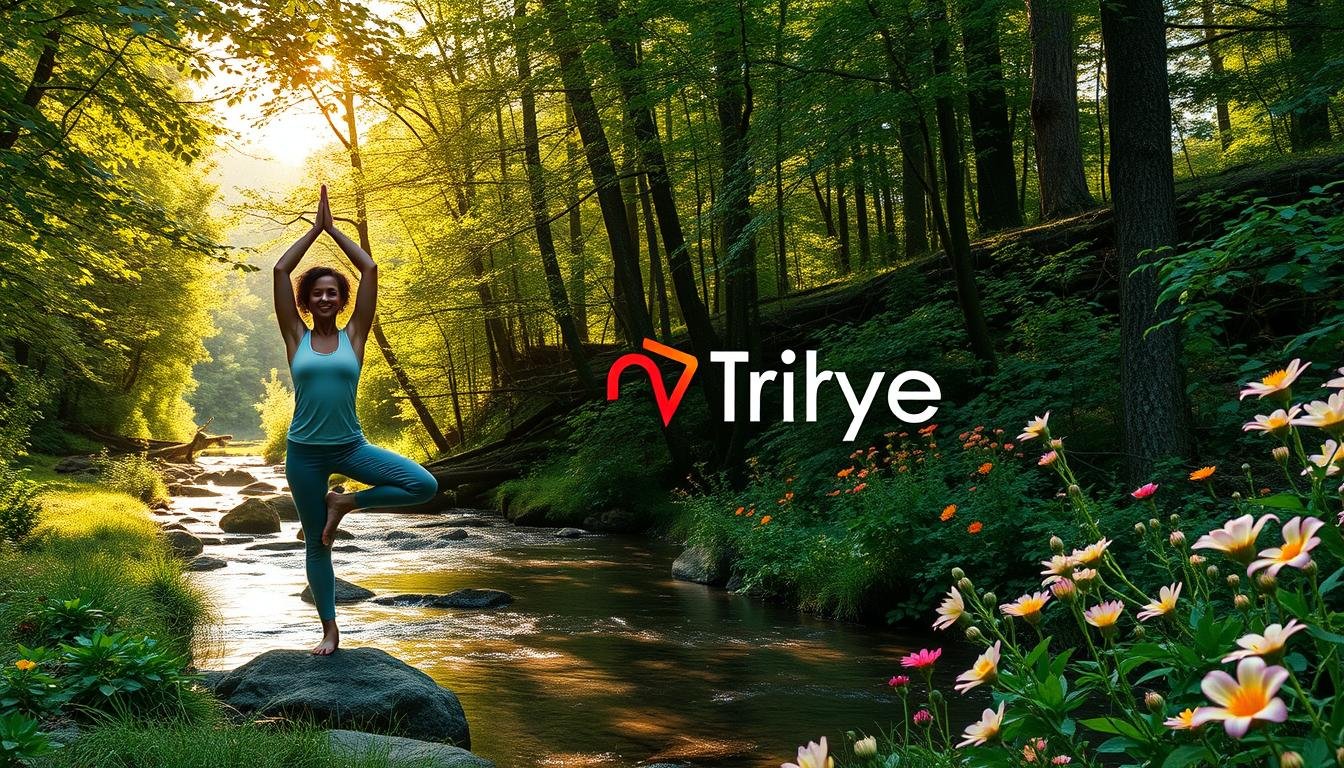In New York, the fast pace of life was overwhelming for Emma, a young professional. She was always busy with work and chasing success. During her lunch break, she found a mindfulness workshop led by a famous life coach. The mindfulness practices for growth she learned helped her slow down, refocus, and find balance in her busy life.
Emma was curious and decided to join. She wanted to find a way to control her life and grow. The workshop showed her how to be present and use the moment’s power.
Emma learned about mindfulness practices. These included meditation and self-awareness exercises. They helped her understand herself and the world better.
Emma was inspired by these practices. She started using mindfulness every day. By slowing down and focusing on her breath, she felt less stressed and more focused.
She also became more emotionally intelligent. This helped her handle her job and personal life better. Emma’s story shows how mindfulness can help us grow and succeed.
In the next sections, we’ll explore more about mindfulness. We’ll look at its benefits, techniques, and strategies. These can help you grow and find fulfillment.
Key Takeaways
- Discover the transformative power of mindfulness practices to enhance personal and professional growth.
- Learn techniques to reduce stress, improve focus, and develop emotional intelligence.
- Cultivate a deeper understanding of yourself and your relationship with the world around you.
- Unlock your true potential by embracing the power of the present moment.
- Embark on a journey of self-discovery and personal growth through mindful living.
What is Mindfulness?
Mindfulness is a powerful practice that invites us to live in the present moment. It helps us see things clearly, with compassion and curiosity. It’s about being fully attentive to the here and now, not the past or future.
Defining Mindfulness
Mindfulness is being consciously aware of our thoughts, feelings, and body sensations in the present. It’s about not judging or getting attached. It helps us respond wisely and calmly to our experiences.
The Essence of Present Moment Awareness
The essence of present moment awareness is focusing on the here and now. It helps us avoid getting lost in thoughts and distractions. By living mindfully, we can fully engage with the moment. This makes our experiences richer and our responses clearer.

“Mindfulness is the aware, balanced acceptance of the present experience. It isn’t more complicated than that. It is opening to or receiving the present moment, pleasant or unpleasant, just as it is, without either clinging to it or rejecting it.” – Sylvia Boorstein
The Benefits of Mindful Living
Practicing mindfulness can greatly improve our well-being. It helps us stay in the present moment. This reduces stress and anxiety and boosts focus and concentration.
These mindfulness benefits spread out, making us emotionally better. We start living more fully and productively.
Reduced Stress and Anxiety
Mindfulness teaches us to handle life’s challenges calmly. It keeps us in the now, away from past regrets or future fears. This way, we manage stress and anxiety better.
Studies have proven mindfulness works well in lowering stress. It also helps us regulate our emotions better.
Improved Focus and Concentration
Mindfulness sharpens our ability to focus. It trains our minds to stay present and engaged. This boosts our productivity in work and personal life.
It also improves our thinking, creativity, and decision-making. Mindfulness enhances our cognitive functions.
| Benefits of Mindfulness | Empirical Findings |
|---|---|
| Reduced Stress and Anxiety | Numerous studies have demonstrated the effectiveness of mindfulness-based interventions in reducing stress, anxiety, and depression symptoms. |
| Improved Focus and Concentration | Research has shown that regular mindfulness practice can enhance cognitive abilities, such as attention, memory, and decision-making. |
Adding mindfulness to our daily routine unlocks its powerful benefits. It leads to a more balanced, focused, and emotionally strong life.
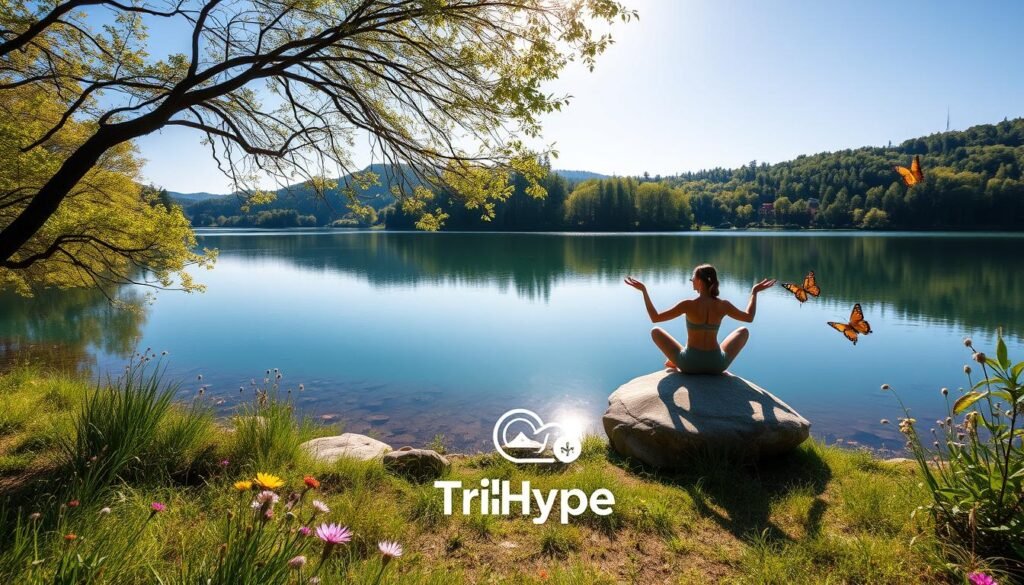
Mindfulness Practices for Growth
Mindfulness is a key tool for personal growth and living consciously. It helps us develop mental, emotional, and spiritual strength. Through meditation and self-awareness, we can succeed in our personal and professional lives.
Meditation is a core mindfulness practice. It trains our minds to stay present and focused. This improves our concentration, clarity, and calmness.
Breath awareness meditation connects us to the present moment. It helps us focus on our breathing. Body scan meditation, on the other hand, makes us aware of our body’s sensations. This builds self-awareness and embodiment.
- Breath Awareness Meditation
- Body Scan Meditation
Journaling is another powerful practice. It helps us reflect on our thoughts and feelings. This way, we can understand ourselves better and grow.
“Mindfulness is the fundamental human ability to be fully present, aware of where we are and what we’re doing, and not overly reactive or overwhelmed by what’s going on around us.”
Mindful communication skills are also crucial. They help us listen actively and communicate without violence. This leads to better relationships and collaborations.
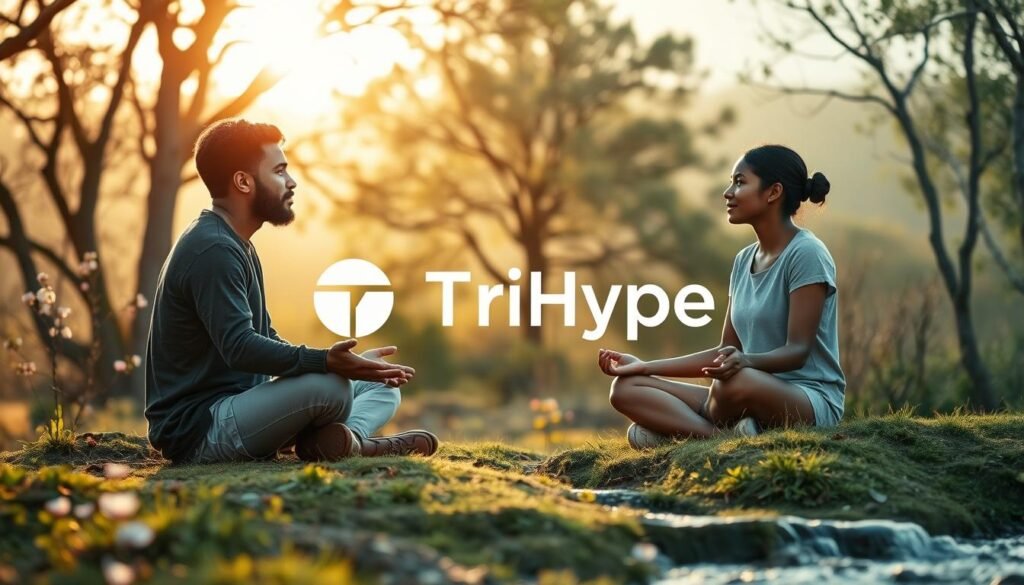
By incorporating mindfulness into our lives, we can reach our full potential. Mindfulness helps us deal with stress, improve focus, and grow as individuals. It’s a powerful tool for personal development and conscious living.
Meditation Techniques for Beginners
Mindfulness meditation helps you stay present, feel calm, and be well. For beginners, breath awareness and body scan meditations are great. They help you start your mindfulness journey.
Breath Awareness Meditation
Breath awareness meditation is a basic mindfulness practice. It focuses on your breath moving in and out of your body. This simple technique helps you stay present, reduces stress, and brings peace.
To do breath awareness meditation, sit comfortably. Close your eyes and focus on your breath. Feel the air through your nostrils or your belly’s rise and fall. If your mind wanders, gently return to your breath.
Body Scan Meditation
Body scan meditation is another easy technique for beginners. It helps you become more aware of your body and be kind to yourself.
To practice body scan meditation, sit or lie down comfortably. Close your eyes and start with your breath. Then, focus on different body parts, noticing sensations without judgment. Move from your toes to your head, staying curious and gentle.
Both breath awareness and body scan meditations are great for beginners. They help you become more mindful and improve your well-being. Try them daily and see how they can change your life.
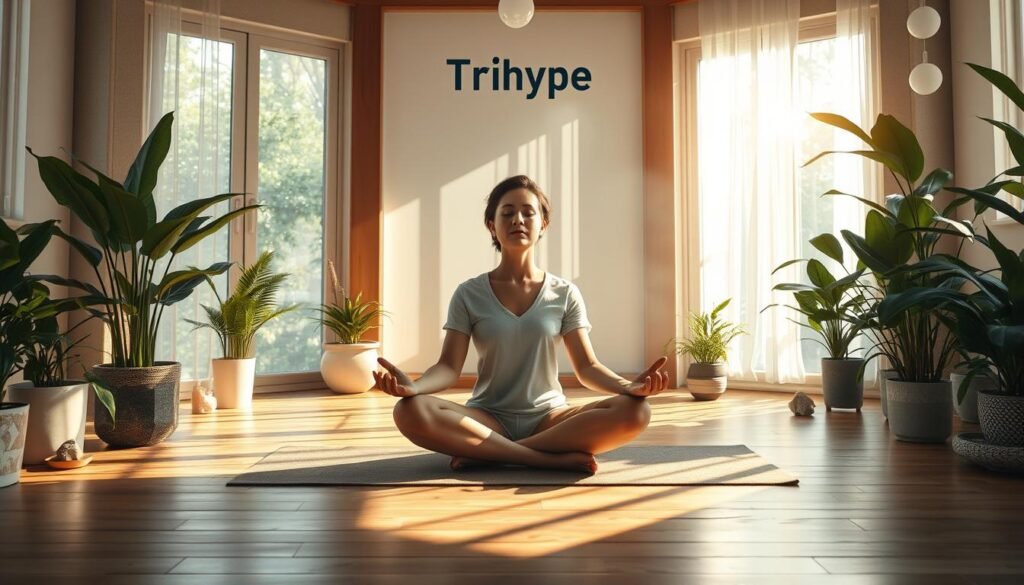
Cultivating Self-Awareness
Starting your journey to personal growth means becoming more self-aware. By paying attention to our thoughts, feelings, and actions, we learn a lot. Mindful journaling is a great way to discover more about ourselves.
Journaling for Mindfulness
Mindful journaling is about writing with purpose and being present. It helps us see our inner world clearly and with kindness. This practice lets us:
- Understand our thoughts, feelings, and reasons better
- Find areas for personal growth and self-awareness exercises
- Develop a sense of mindful journaling and control our emotions
- Think deeply about our experiences and find meaning in our lives
By doing mindful journaling often, we uncover deep insights. This is key for growing as a person.
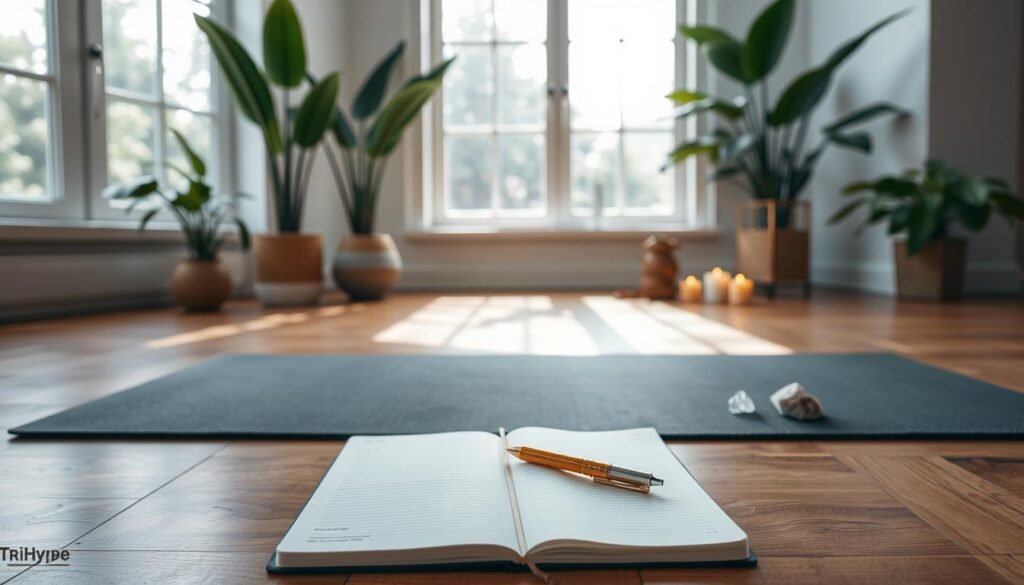
Using mindful journaling for self-reflection can make our lives more meaningful. It helps us understand ourselves better and shape our future with purpose.
Emotional Intelligence Training
Emotional intelligence helps us understand and manage our feelings. It’s key to mindful living and personal growth. By improving our emotional intelligence, we make better choices, strengthen bonds, and face challenges with strength.
Building emotional intelligence takes a few steps. First, we need to know ourselves better. This means understanding our feelings and reactions. It helps us react wisely, not impulsively.
Next, learning to be empathetic is crucial. Empathy lets us see things from others’ perspectives. This way, we build stronger connections, solve problems better, and create lasting relationships.
Lastly, we must learn to control our emotions. Mindfulness and certain techniques help us manage feelings. This way, we stay calm, even when things get tough.
Investing in emotional intelligence training opens doors to personal growth. It improves our self-awareness, empathy, and emotional control. This makes us better at handling life’s ups and downs with clarity and kindness.
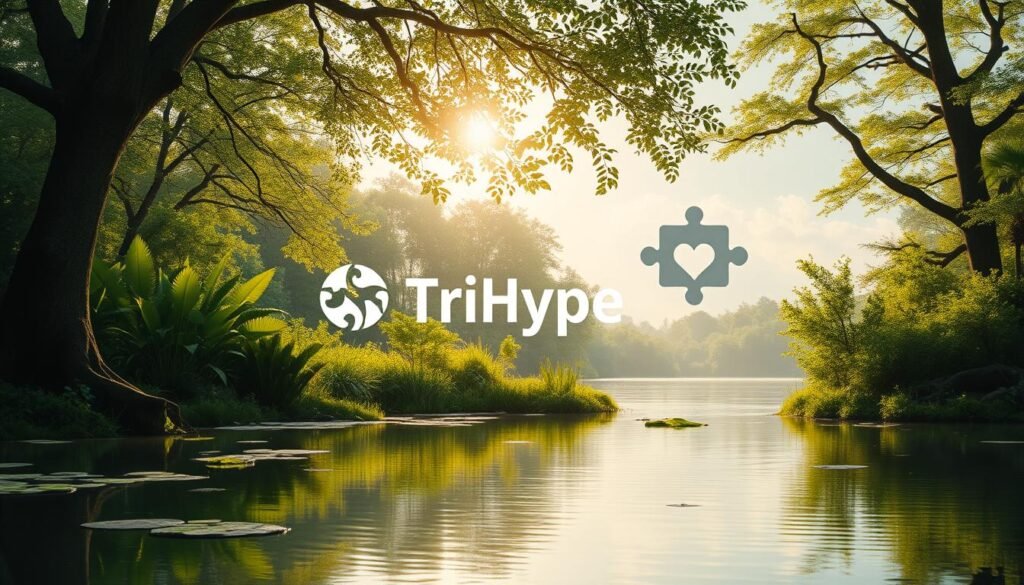
“Emotional intelligence is the ability to sense, understand, and effectively apply the power and acumen of emotions as a source of human energy, information, connection, and influence.”
–Robert K. Cooper, author and leadership expert
Mindful Communication Skills
Effective communication is key to mindful living. It helps us connect deeply with others and understand relationships better. We’ll look at mindful communication skills, like active listening exercises and nonviolent communication techniques. These can make our connections more real and meaningful.
Active Listening Exercises
Active listening is a core part of mindful communication. It lets us truly hear and get others’ views. This is vital for empathy and solving conflicts. Here are some exercises to practice active listening:
- Reflective listening: Repeat back what you’ve heard to make sure you got it right.
- Focus your attention: Remove distractions and listen fully, keeping eye contact.
- Ask for clarity: If something’s unclear, ask for more details to understand better.
Nonviolent Communication Techniques
Nonviolent communication (NVC) helps us use interpersonal skills for understanding and connection. It’s about sharing our needs and feelings and empathizing with others. This way, we can solve problems with kindness and find common ground. Here are some NVC techniques to try:
- Observation-based communication: Describe what you see without judgment.
- Expressing feelings: Share your feelings using “I” statements to own them.
- Identifying needs: Recognize the needs or values behind your feelings and actions.
- Requesting solutions: Ask for specific actions to meet your and others’ needs.
Using these mindful communication methods daily can improve our relationships. It leads to more fulfilling and harmonious connections, enhancing our overall well-being.
“The most basic and powerful way to connect to another person is to listen. Just listen. Perhaps the most important thing we ever give each other is our attention.” – Rachel Naomi Remen
Mindfulness in Daily Life
Adding mindfulness to our daily routines can greatly improve our well-being. It brings presence, awareness, and intention to our daily activities. This unlocks the power of mindful living.
Mindful Eating Practices
Mindful eating is a powerful way to add mindfulness to our lives. Mindful eating means enjoying each bite. We focus on the food’s flavors, textures, and how it feels in our mouths.
This practice helps us appreciate our food more. It also encourages us to choose what we eat more thoughtfully.
Mindful Movement and Exercise
Mindfulness can also change how we view exercise. Instead of rushing, we focus on our body’s sensations and our breath. This makes our workouts more effective and improves our mental state.
By living mindfully, eating mindfully, and exercising mindfully, we grow personally. We reduce stress and enjoy the present moment more.
| Mindful Eating | Mindful Movement and Exercise |
|---|---|
| Savoring each bite | Tuning into body sensations |
| Paying attention to flavors and textures | Focusing on breath rhythm |
| Being fully present during the meal | Embracing the fluidity of motion |
“The present moment is filled with joy and happiness. If you are attentive, you will see it.” – Thich Nhat Hanh
Personal Development Strategies
Embracing personal development and a growth mindset can change our lives. By setting goals that match our values, we can reach our full potential. This section will show you how to set mindful goals for personal growth.
Setting Mindful Goals
The first step in setting mindful goals is self-reflection. We need to know our values, passions, and dreams. Then, we can set goals that truly reflect who we are and who we want to be.
- Start with a clear vision: Imagine your ideal future self and the positive changes you’ll make.
- Align goals with your values: Make sure your goals match your core values and principles.
- Break down big goals: Turn big goals into smaller steps to stay focused and motivated.
- Incorporate regular check-ins: Check your progress often and adjust your goals as needed.
- Celebrate small wins: Recognize and celebrate your achievements along the way.
By using a mindful approach to goal setting, we can grow and make progress towards our goals.
“The journey of a thousand miles begins with a single step.” – Lao Tzu
Remember, personal development is a journey, not a finish line. With patience, kindness to ourselves, and a love for learning, we can reach our true potential. We can live a life filled with purpose, fulfillment, and growth.
Mindfulness-Based Stress Management
Stress affects our body, mind, and emotions deeply. Mindfulness-based methods are great for managing stress. We’ll look at mindfulness techniques to help you deal with stress and find balance.
Mindfulness focuses on being present. It helps us stop worrying and respond better to tough situations. This way, we can handle stress with more calm and strength.
Mindful Breathing Exercises
Breathing is key in mindfulness for stress. It helps us relax and calm our mind. Here are some easy breathing exercises to try:
- Diaphragmatic breathing: Inhale slowly through the nose, letting the belly rise, then exhale through the mouth.
- Box breathing: Inhale for 4 counts, hold for 4 counts, exhale for 4 counts, and hold again for 4 counts.
- Alternate nostril breathing: Close one nostril with your thumb and forefinger, then inhale and exhale through the other, switching sides.
Body Scan Meditation
Body scan meditation is another great technique. It involves focusing on each part of your body, noticing any tension. This helps release stress and increases body awareness.
| Mindfulness-Based Stress Management Techniques | Benefits |
|---|---|
| Breath Awareness | Activates the relaxation response, quiets the mind |
| Body Scan Meditation | Releases physical tension, enhances bodily awareness |
| Mindful Movement | Reduces stress, improves physical and emotional well-being |
Adding these mindfulness techniques to your daily life can help manage stress. Mindfulness is a journey, but the calm and centered mind it brings is worth it.
“The greatest weapon against stress is our ability to choose one thought over another.” – William James
Conscious Living Principles
Mindfulness goes beyond just our own well-being. It helps us make better choices about what we buy, how we live, and our impact on the planet. By following conscious living principles, we can live more sustainably.
Mindful Consumption and Sustainability
Mindful consumption is at the core of conscious living. It means thinking carefully about what we buy and its effects. By choosing eco-friendly options, we help reduce waste and support green businesses.
- Prioritize purchasing from ethical, eco-friendly brands and local producers.
- Minimize waste by embracing a circular economy, where products are reused, repaired, or recycled.
- Adopt a minimalist lifestyle, focusing on quality over quantity and reducing overall consumption.
By making these choices, we help create a better future. We inspire others to do the same. Our actions can make a big difference for our planet and our own happiness.
“The greatest threat to our planet is the belief that someone else will save it.”
Embracing conscious living empowers us to be the change we want to see. By choosing sustainability, we build a brighter, more sustainable world for everyone.
Developing a Growth Mindset: Unlock Your Potential
Conclusion
In conclusion, the mindfulness practices we’ve looked at are a powerful way to grow personally and professionally. They help us stay in the present, understand ourselves better, and improve our emotional skills. This leads to success, happiness, and better well-being.
Let’s use these mindfulness techniques to start a journey of conscious living and growth. The mindfulness principles are key for lasting progress and growth in all areas of life. This guide has shown us how to improve our minds, emotions, and how we connect with others.
By adding these mindfulness practices for growth to our daily lives, we can find more purpose and strength. We become better at handling life’s ups and downs.
Let’s keep practicing mindfulness and see its amazing effects. This path of self-discovery and conscious living will help us reach our highest potential. We’ll make a more meaningful, happy, and lasting future for ourselves and others.
